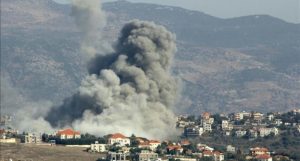
Palestine : A military parade of Al Qassam Brigades in Rafah
Gaza City, 6 Sya’ban 1438/3 May 2017 (MINA) – Hamas’s founding charter was announced to the world from a Gaza refugee camp in 1988. The setting for its first ever policy update on Monday night – a glitzy hotel in Doha – shows how nearly 30 years on, the organisation’s aims have shifted.
While the new manifesto is widely viewed as a rebrand for the fundamentalist Islamist group that seized control of the Gaza Strip in 2007, many of the new declarations have been discussed by Hamas officials for years.
Also Read: Singapore Sanctions Four Israelis Over Violence Against Palestinians in West Bank
The decision to present a more pragmatic political programme now is the result of both the growing dissatisfaction of Gazans with nothing to show after 10 years of Hamas rule, and the pressure of strained relations with the rival Palestinian Authority (PA), Egypt, Israel and the new US administration.
The new document – four years in the making – is still a milestone in the group’s history. While it does not explicitly recognise the state of Israel, it accepts the borders of a Palestinian state within the pre-1967 boundaries for the first time, and drops the anti-Semitic language for which the original charter was heavily criticised.
Not radical, pragmatic and civilised
It also erases all mentions of ties to the Muslim Brotherhood, the pan-Arab Islamist movement which has been banned by the authorities in neighbouring Egypt.
“The document gives us a chance to connect with the outside world,“ independent.co.uk quoted spokesperson Fawzi Barhoum as telling reporters in Qatar on Monday.
Also Read: Israel Issues 40 Demolition and Stop-Work Orders in Jerusalem
“Our message is: Hamas is not radical. We are a pragmatic and civilised movement. We do not hate the Jews. We only fight who occupies our lands and kills our people.”
“Hamas’s movement is a viable, renewable developing movement in their ideologically awareness and political performance as much as it is developing in its struggle and fighting aspects,” Khaled Mashaal, the organisation’s outgoing exiled leader, added.
The perceived softening of Hamas’s stance has been dismissed by Israeli authorities. A spokesperson for Prime Minister Benjamin Netanyahu’s office said the group was just “attempting to fool the world” it had changed its terrorist stripes.
But the signalling of a new direction is as much about internal Palestinian politics as international relations, said Diana Buttu, a Ramallah-based political analyst and former advisor to Palestine Liberation Organisation (PLO) chair and PA President Mahmoud Abbas.
Also Read: Israeli Occupation Army Kill Five Palestinians Emerging From Tunnel in Rafah
“This turns up the pressure on Abbas,” she told The Independent. “The PA has been exerting enormous pressure on Gaza recently: financially, trade tariffs, aid.
“But he can no longer say that Hamas is too extremist as an excuse not to restart the reconciliation process with the PA now.”
Whether the official policy changes will be enough to improve relations with either the PA or Egypt, which has maintained a crippling border blockade against Hamas since 2007, remains to be seen.
And while the new declarations are a marked departure from Hamas’s founding charter, since the group still refuses to recognise previous PLO-brokered peace deals and to denounce the use of violence, the international community is unlikely to reconsider its near-universal status as a terrorist organisation.
Also Read: Israeli Occupation Army Expands ‘Yellow Zone’ in Gaza, Trapping Families
Hamas’s announcement comes just two days before President Abbas is due to visit US President Donald Trump in Washington DC.
The pair are expected to discuss the 10,000 new Jewish settler homes in the West Bank announced since Mr Trump took office. (T/RS05/RS01)
Mi’raj Islamic News Agency (MINA)
Also Read: Israel Can Resume Gaza Aggression if Hamas Doesn’t Disarm: US















![Israeli tanks and APC’s gather by the Israeli – Lebanese border. Amid Israel’s escalating campaign against Hezbollah in Lebanon on September 30, 2024. [Erik Marmor/Getty Images]](https://en.minanews.net/wp-content/uploads/2024/10/IMG_20241001_203226-300x197.jpg)
















 Mina Indonesia
Mina Indonesia Mina Arabic
Mina Arabic